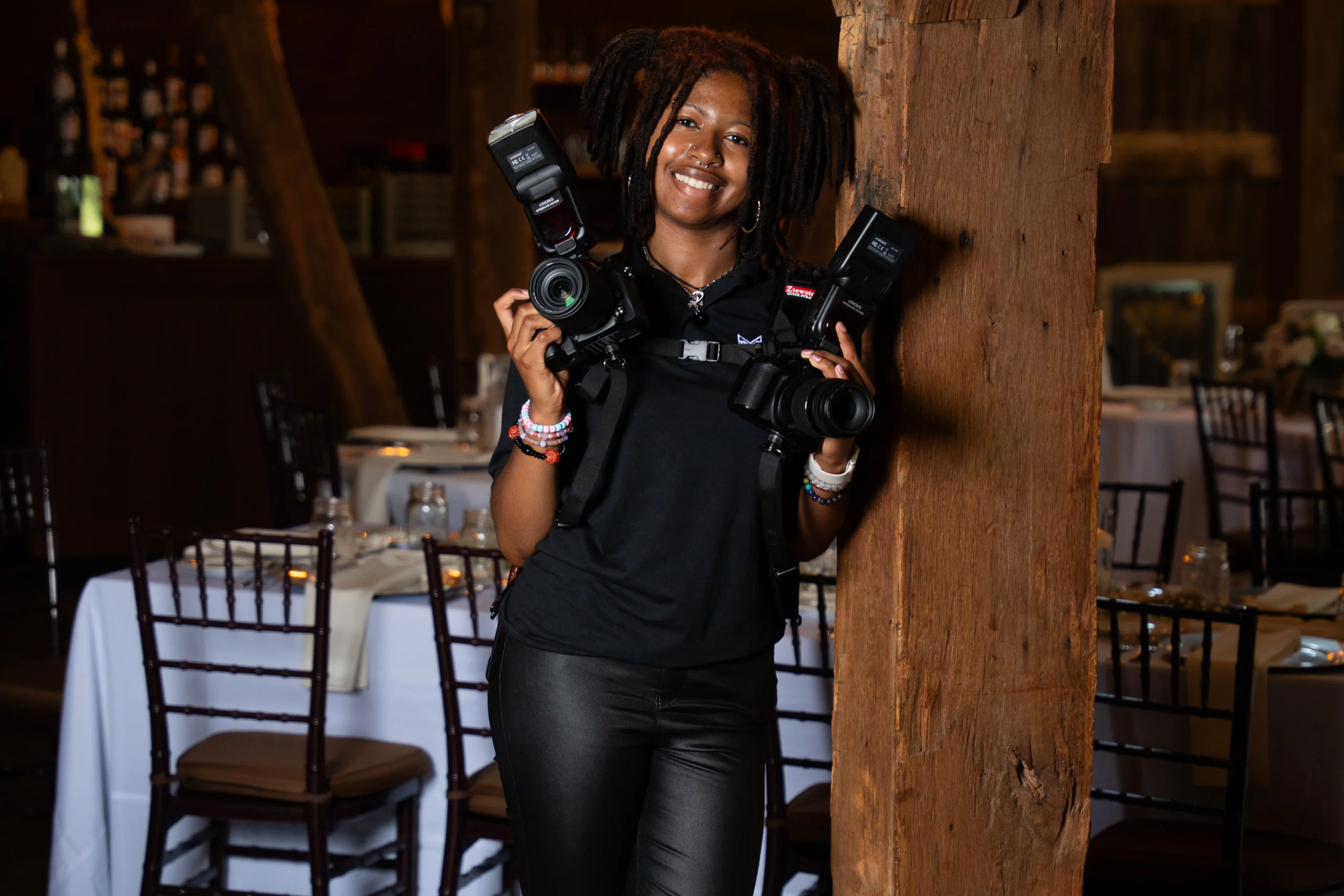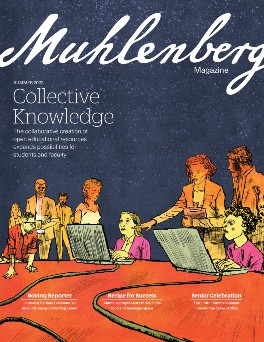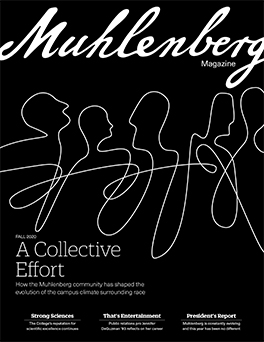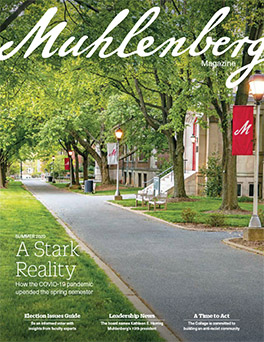
How WMUH Launched a Career in Band Management
Former WMUH music director Reynold “Rennie” Jaffe ’98 now manages a roster of indie darlings (including Kurt Vile, Waxahatchee, Alvvays and Snail Mail) through the boutique artist management house he co-founded in 2017, Another Management Company.
Rennie Jaffe ’98 served as music director for WMUH in the pre-Spotify era — the pre-Napster era, even. Radio stations that played music outside the mainstream, like WMUH, were the primary vehicle for discovering new artists. If you heard one song you liked and you wanted to hear more, you could take a gamble and buy the whole album, a not-small investment considering that CDs cost about $34 in today’s dollars.
Jaffe, a voracious music consumer throughout middle and high school, never hesitated to invest in expanding his aural horizons. If he bought an album and liked it, he’d scour the liner notes for other bands mentioned there and buy their albums. Or, he’d send away to the record label for a complete catalog and try albums from some of their other artists.
Many of those same labels would send CDs to college radio stations, including WMUH, with the hopes of their artists’ music reaching the less-obsessive fans of the world. Jaffe got involved with WMUH as a DJ his first semester and became music director — the person whose job it was to sort through all that incoming material — as a sophomore, a position he held for the remainder of his time at Muhlenberg.
“This was the height of the CD era. We would get, no exaggeration, 50 new releases a week that I would listen to,” Jaffe says. “It really tapped into my singular passion.”
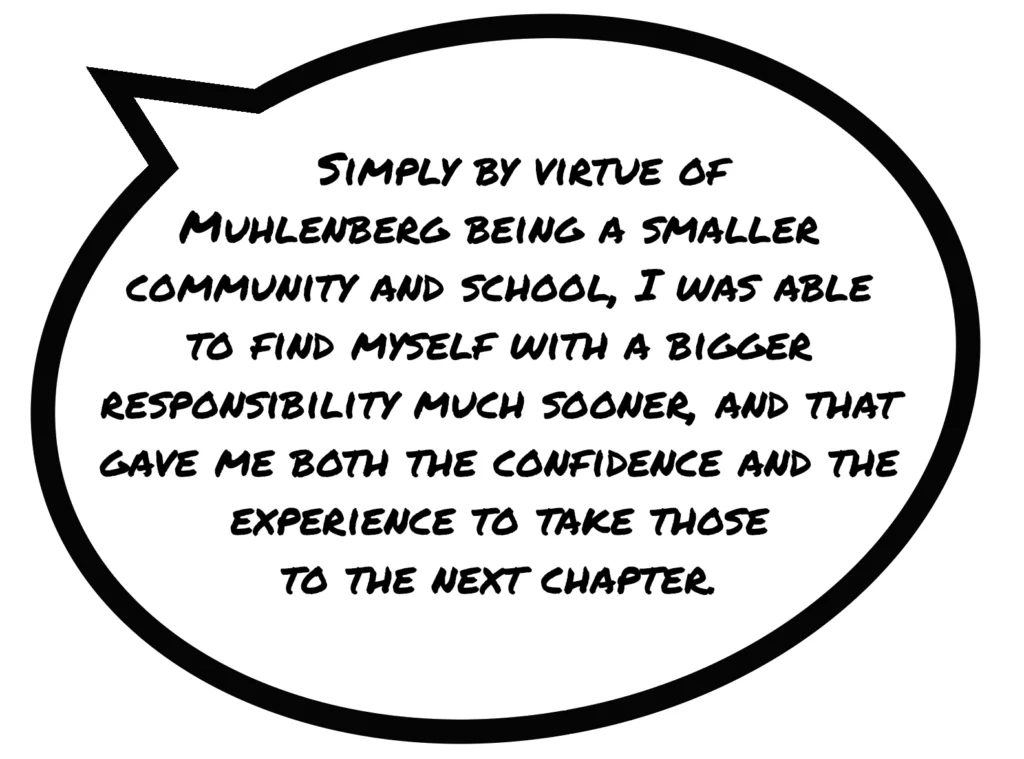
In addition to the two or more shows he would DJ each week, Jaffe would spend six to eight hours a week at the station holding office hours. That’s when he’d listen to album after album or field calls from radio reps at record companies, pitching him new records or asking for his feedback on what they’d already sent. He got to know student and community DJs and their musical tastes, which allowed him to recommend new albums to people who might want to play them. He made connections with industry insiders, some of whom he now deals with professionally as the co-founder of Another Management Company. His boutique artist management house represents Stephen Malkmus (of Pavement fame), Tim Heidecker (of Adult Swim fame) and a variety of buzzy indie artists including Horsegirl, Waxahatchee and Jaffe’s first management client and best friend, Kurt Vile.
“My path could’ve looked a lot different if I’d started somewhere besides Muhlenberg and WMUH,” says Jaffe, who likes to say he majored in WMUH. “At a bigger school, there are hundreds of kids that want radio shows and there are dozens of people that want the administrative positions. Simply by virtue of Muhlenberg being a smaller community and school, I was able to find myself with a bigger responsibility much sooner, and that gave me both the confidence and the experience to take those to the next chapter.”
In the Pitt
For Jaffe, an English major, the next chapter was the University of Pittsburgh School of Law. He’d interned with one of the only record companies in his hometown of Philadelphia, Rykodisc, every summer as a student at Muhlenberg, and that got him interested in a future in entertainment law. He saw it as a way to stay close to the industry he’d always loved.
His law school years were also when his relationship to music and musicians transformed: “In Pittsburgh, I became part of a music scene,” he says. “That’s where the wall broke for me, where it was no longer like, ‘These are rock stars that are making these CDs and that are in these magazines that I was reading over and over.’ The wall broke and I realized, ‘Oh, these are just people, and I can be friends with these people.’”
Jaffe noticed that some of the bands he wanted to see would be on tour and skip over Pittsburgh. He started writing to bands, asking them to play his city. He discovered that some artists had booking agents whose responsibility it was to negotiate gigs. He became part of a group of DIY music promoters who ultimately leased a storefront and turned it into a concert venue that could hold about 150 people.

Jaffe brought big names of indie rock to play there well before they were big names. For example, Death Cab for Cutie stopped there on its first national tour in 2000; this fall, Death Cab sold out two nights at Madison Square Garden as part of a 20th anniversary tour honoring the 2003 album Transatlanticism. Conor Oberst came through with one of his many bands, Bright Eyes, also in 2000; Rolling Stone named Oberst the best young songwriter in America in 2005, and his work on several projects, including Bright Eyes, has been critically acclaimed. (In a full-circle moment, Oberst and Bright Eyes are the latest additions to Another Management Company’s roster.)
“I found that my bandwidth for things I’m really curious and hungry and passionate about was very elastic,” Jaffe says, noting that he was at shows he’d booked four or five nights a week on top of his law school workload. “That was my social life … It’s not like I went to law school and then had a [side] job as a bank teller. This was gratifying.”
“Doing Manager Things”
Jaffe continued working with Rykodisc as a legal intern during law school and then as a full-time employee on its legal team after earning his law degree. Meanwhile, he kept coming back to WMUH as a community DJ, in the summers during law school and more regularly upon moving to Philly, for 10 years after graduating. He got his first taste of band management through a connection at Rykodisc, a legal intern who was friends with the garage-rock band The Greenhornes: “That was the first band that called me their manager,” Jaffe says. “I didn’t know what I was doing, but sometimes, that’s how you figure out what you need to do.”
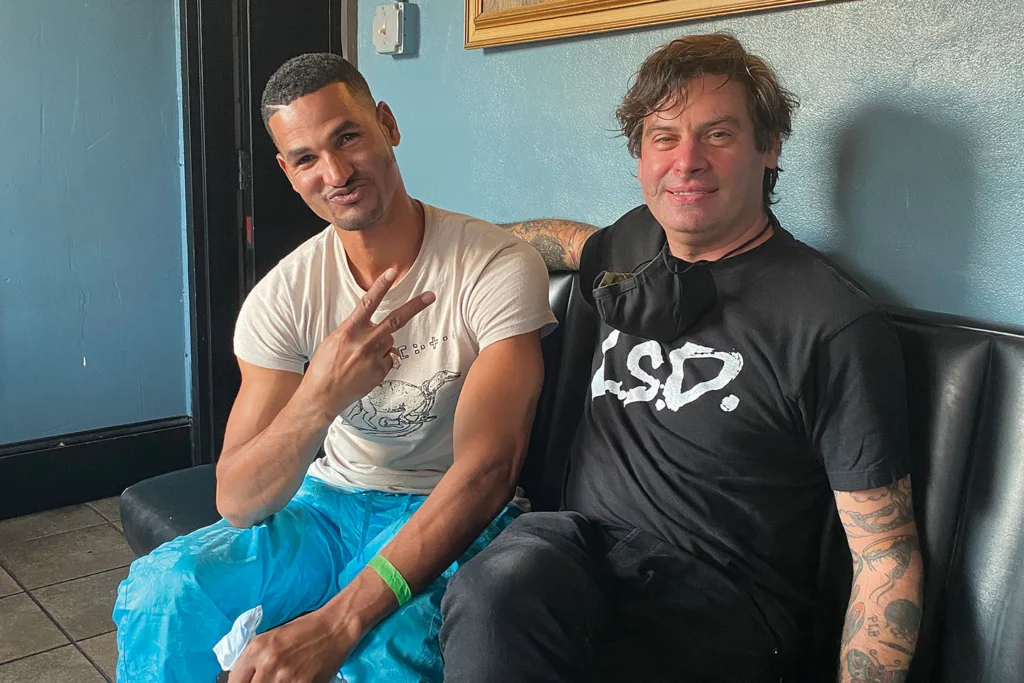
What band managers do, Jaffe discovered, is a mix of organizational and creative tasks. Because musicians earn money from a variety of sources — shows, record and merch sales and licensing, to name a few — managers keep tabs on those revenue streams and ensure artists are being paid for their work. Managers might also coordinate travel, lodging and other logistics for tours and promotional appearances. On the creative side, managers help clients execute their artistic vision. That could mean considering which recording studios and producers could be a good fit for a forthcoming album, imagining what album art might look like, narrowing down potential directors for a music video and so on. It’s the creative side of management that Jaffe is passionate about.
The first artist that Jaffe managed in this more complete way was Philadelphia’s Kurt Vile, starting in 2008. Jaffe’s wife ran a record store in Old City, and Vile would bring in homemade CDs for the shop to sell. Jaffe listened to one and “immediately thought it was special,” he says. He asked his wife to make an introduction, and Jaffe quickly learned that a handful of record labels were interested in signing Vile. Jaffe, who had moved on to the metal-forward label Relapse, had by then established relationships with executives at multiple labels. He offered to help Vile shop his record to the three major indie labels at that time, and all three were interested. Vile ultimately signed with Matador Records. Jaffe then helped Vile navigate the multiple booking agents who were interested in working with him.
“At that point we realized: ‘I’m doing manager things.’ I became his manager, all with just a Gmail address. I didn’t have a company. I was just managing Kurt Vile,” Jaffe says. “He put out his first record on Matador 15 or so years ago. That gained real legs, and it just really grew in an organic, one-foot-in-front-of-the-other way. It wasn’t an overnight success. Every record was bigger than the last one. Every tour was bigger than the last one.”
Meanwhile, the Philadelphia indie scene was flourishing. Vile was part of it, and was the first act to find major success: He has since gone on to be an answer on Jeopardy!, play a roadie on Portlandia, sell hundreds of thousands of records and even have a day named in his honor in Philadelphia. Labels started looking toward his home city for the next big thing. And local artists began looking toward Jaffe, with his experience managing Vile and his legal background, as they began getting more attention and interest.
“I became — and I loved becoming — the guy that bands would come to to give my two cents on, ‘Which record deal should I choose? What does this contract mean that this label offered me?’” Jaffe says. “Even if I wasn’t their manager, a lot of folks would ask my advice, and I was really excited to be in that position.”
He did go on to become the manager for one of those acts: Waxahatchee, the musical project of Katie Crutchfield, whose Cerulean Salt (2013) was named among the best albums of the 2010s by Stereogum and Rolling Stone, while Vogue called her latest album, 2020’s Saint Cloud, the “best album of her career.” Jaffe, who describes himself as a “superfan” of her work, began working with her shortly after Cerulean Salt’s release, just as she’d signed to a larger label.
His third “client” (“if you want to call bands and friends clients,” he says) was one he discovered: Snail Mail, the solo project of Baltimore’s Lindsey Jordan. He heard her demo on Bandcamp when she was still in high school and says he was “floored by” it. He reached out and offered to manage her. She’s since released two critically acclaimed albums with Matador; 2021’s Valentine made best-of-year lists from Stereogum, The New York Times and Pitchfork, among others.


Mural of the Story
Jaffe was heavily involved in the production of this mural in Philadelphia, which was used for the cover of Kurt Vile’s 2013 breakout album Wakin’ on a Pretty Daze. Jaffe had been in touch with the artist, Steve Powers, who was interested in using one of Vile’s songs in a documentary. Jaffe had the idea to have Powers design the fonts for the album, which spiraled into the idea to make a mural broadcasting the album’s name. “It wouldn’t have been possible if the record wasn’t phenomenal,” Jaffe says. “But it set the tone: This wasn’t just another record. This was a big-deal artist who made a culturally significant piece of art that demanded documentation and celebration.”

In Good Company
It was around the time Jaffe began working with Snail Mail that Jaffe’s friend and Vile’s booking agent, Eric Dimenstein, intervened: “Up until that point, I did everything. I was a control freak,” Jaffe says. “[Dimenstein] really, really encouraged me to relinquish some control, to really come to terms with what I’m good at. While I can rent vans and book flights and reserve hotel rooms just fine, that’s not why these bands want me to manage them.”
Dimenstein suggested they start a company together and hire what’s called a day-to-day manager to handle logistics so Jaffe could focus on the creative side of band management. They founded Another Management Company in 2017. Today, the company employs 12 people (including Jaffe and Dimenstein) and manages 24 artists, all of whom Jaffe is proud to support.
“I’ve found, even from WMUH days and Muhlenberg days and law school days, that I’m only good at assignments that I really believe in. Part of the reason I never worked for somebody else’s management company is because I never had a career ambition to be a manager. It wasn’t the job description that attracted me; it was the bands,” he says. “We’re pretty selective. I’m proud of our roster in our corner of the music industry. Everyone that we represent is many people’s favorite bands, which is really special to me.”
After a weird year or so during the early pandemic, Jaffe’s work — and the work of the artists he manages — is largely back to normal. What that looks like in practice is a fair amount of travel, about 25 flights per year, to support his clients as they navigate things like negotiating record contracts or making important press appearances. The rest of the work can be done from his office in Upper Darby, a community just outside Philadelphia. But to call any of it work, Jaffe says, is kind of a misnomer.
“I’ve created a life where, on the one hand, I don’t have a 9 to 5 job — it’s a 7 a.m. to midnight job. But these are all my friends. Every band that I work with are close friends of mine,” he says. And he credits his time at Muhlenberg for setting him up for this job that doesn’t feel like a job: “I really say that WMUH was my major. It gave me both relationships and skills that directly tie into my day-to-day life here, and then it gave me sort of bigger picture life skills … I learned to manage my time and set goals for myself that were not just for myself, that other people relied on and depended upon. I learned how to be a manager of other people, of a staff, at WMUH.”





